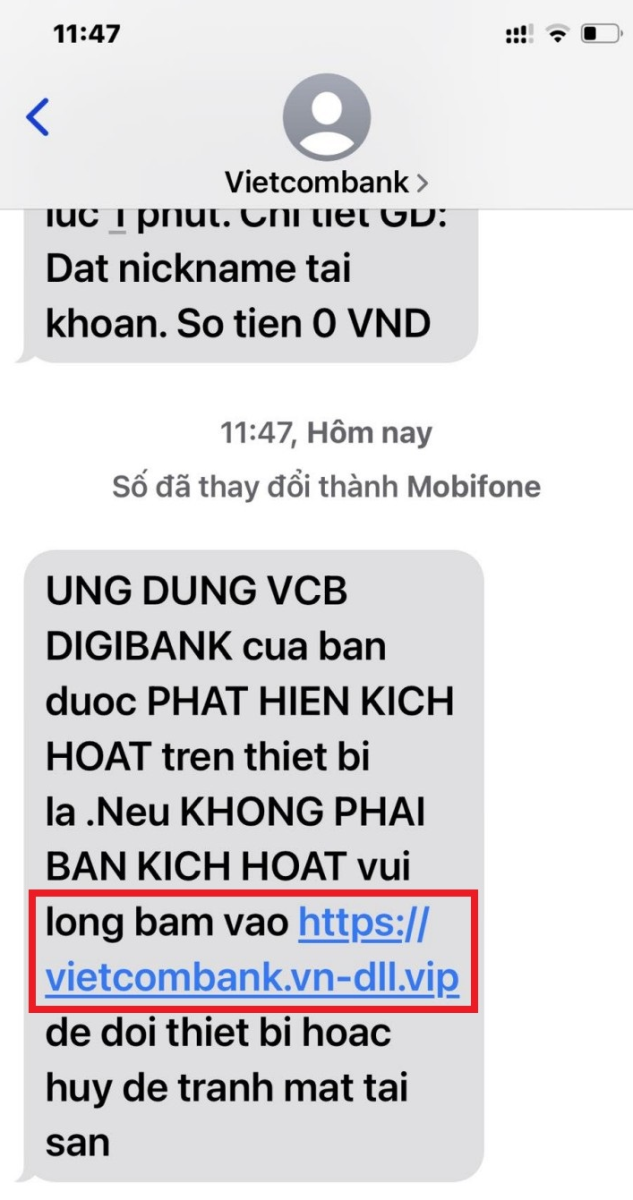75% of Vietnamese mobile users receive online financial fraud messages and calls
- Tram Ho
More and more sophisticated tricks
According to records from the Vietnam Information Security Warning portal (at canhbao.khonggianmang.vn), in 2022, nearly 13,000 cases of online fraud were recorded, with 2 main types of fraud: fraud to cheat personal information theft (accounting for more than 24%) and financial fraud (accounting for nearly 76%). The scam to steal personal information is also a stepping stone to continue the scripting of financial fraud.
However, according to the Department of Information Security, the number of cases of online fraud is much higher than the statistics because many people do not report it, because the victims often have the mentality of ignoring “it’s gone.” , afraid of complicated legal and reporting procedures. Therefore, in addition to the issue of training and raising public awareness, it is necessary to deploy and use high technology to apply, prevent and handle high-tech crimes.

A mobile phishing message.
From the perspective of enterprises participating in the Coalition to raise awareness and skills to ensure information security (ATTT), a representative of Bkav said that in the past year, many people have become victims of scams. online financial scam. It can be mentioned as the case of losing 2.1 billion dong in the account due to SIM upgrade fraud in Ho Chi Minh City) or the case of losing more than 5.5 billion dong after answering the phone and following the request of the thief. fake police (Hanoi).
In addition to the two forms mentioned above, the bad guys also “process” many scenarios to trick users into traps such as enticing money to do “online tasks”, impersonating relatives to request money transfer, impersonating authorities. traffic violation report…
The hacker’s “carpeting” strategy and increasingly sophisticated tricks make users a little careless and become a victim. According to Bkav’s statistics, 3 out of 4 Vietnamese users receive online financial fraud messages and calls.
Fake SMS Brandname messages from banking and financial institutions are also favored by hackers in 2022. According to Bkav’s survey results, more than half of Vietnamese users are bothered by these messages. Thanks to the improvement of users’ cyber security awareness, the number of people making requests in fake messages only stood at 5.7% (according to Bkav’s report), but this is still a “bait” lucrative” for hackers.
To avoid falling victim to these phishing campaigns, users are advised to verify their information at the official website of the organization. Do not rush to make transactions via addresses, phone numbers or emails received from the same Brandname message.
According to Bkav’s statistics, Vietnam currently has 6.8 million participants in the cryptocurrency market, among the top countries with the highest number of participants in the world. This has many potential security risks, because this is a new, incomplete and unrecognized market in many countries, including Vietnam. According to Bkav’s survey, 49% of domestic crypto investors do not have a full understanding but “play” according to crowd psychology or through friends.
Mr. Nguyen Van Cuong, General Director in charge of Cybersecurity of Bkav said: “The issue of cryptocurrency security is quite complicated, from the risk of being manipulated by public opinion, to the price control of issuers. Algorithmic digital currency, fraud control mechanism of exchanges and issuers to cyberattacks of hacker groups… Users should be fully equipped with knowledge, especially paying attention audit information when participating in this market. This is important information, but not many users are interested in it.”
There is agreement between the parties
Tran Dang Khoa, Deputy Director in charge of the Information Security Department, said that to protect people and the community from online fraud, it is necessary to have a synergistic cooperation between authorities and businesses. service providers, safe enterprises, network security. In particular, the units have implemented many technical measures, propaganda activities, raising awareness for customers and people. The Department of Information Security said that some measures have initially brought certain effects.
Specifically, in 2022, more than 2,620 online fraud and illegal websites have been prevented and handled (more than 1,460 online scam sites) and protected more than 4.7 million people (equivalent to 6.7). % of Vietnamese Internet users) against online phishing attacks, breaking the law in cyberspace.

Scams will become increasingly sophisticated.
Measures implemented by the authorities such as: Developing information pages, handling spam and fraudulent SMS messages (at the address chongthurac.vn); Develop a Vietnam information security warning page (at canhbao.khonggianmang.vn/canhbao.ncsc.gov.vn) so that people can report information security problems; Provide online fraud identification toolkit, fraud prevention knowledge and skills (at address congcu.khonggianmang.vn); Announcement of a blacklist of offending sites and fraudulent bank accounts through the portal of the network’s trust ecosystem (at the address xinnhiemmang.vn); Check and assign credit labels to more than 3252 official websites; Deploying anti-malware campaigns, cleaning up cyberspace every year across the country.
In addition, businesses also have measures and activities to prevent fraud such as banks, securities, e-wallets, financial institutions deploying notifications to customers via email, SMS. Continually report online fraud risks related to the organization to the authorities.
In 2023, scams in the form of sending messages and calling will continue to be popular when hackers can make money easily with transactions up to billions of dong. Although user awareness has improved, hackers will have more and more sophisticated tricks.
Experts predict that APT attacks (targeted high-tech cyberattacks) for espionage will increase in 2023. Bkav’s representative recommended that agencies and organizations continue to comply and push faster the implementation according to Directive 14/2018/CT-TTg “On improving capacity to prevent and combat malware” and 14/2019/CT-TTg “On strengthening assurance of safety and security Cybersecurity to improve Vietnam’s ranking index” by the Prime Minister to improve the capacity and effectiveness of Vietnam’s cybersecurity.
As a representative of Coc Coc browser, said that as a member of Coalition to raise awareness and skills to ensure information security, Coc Coc’s network security feature set was built to raise awareness and increase awareness. provides solutions to protect users against the risks of information insecurity when online with a multi-layered security system: Block malicious ads, Warning dangerous websites, Authenticate website owners.
Groups of websites prioritized for authentication include: Websites of organizations and state agencies; banking-financial organizations; news and press units; companies, brands or services online. The reason, according to Coc Coc’s research, this is the group of websites most faked by hackers and is at risk of causing a lot of damage to personal information and money for users. The Green Lock icon of the Website Authentication feature will act as a “green light” signal for the online version, helping you to rest assured to “surf” the correct website and prevent website spoofing attacks.
According to the Department of Information Security, the implemented solutions all promote positive values, but they have not been synchronized and unified among ministries, branches and localities.
In order to deal with online fraud similar to real-life fraud, it is necessary to have the coordinated and synchronous participation of central and local authorities. In particular, the core is the police force in charge of high-tech crime prevention.
Source : Genk
